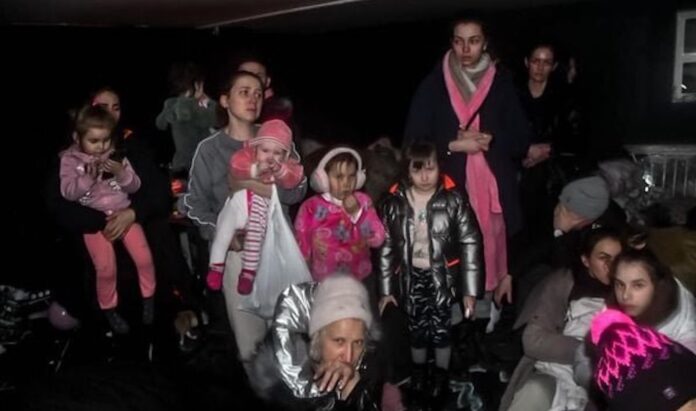The horrors of the war in Ukraine continue ruthlessnessly, as international public attention wanes adapting, perhaps, to the prospect of a long-lasting war. Mariupol is reduced to piles of rubble among which piles of unburied corpses go rotting. Choleric vibrio circulates in water pipes polluted with sewage waste. T
You can only enter the city but not leave it
he World Health Organization can only express concern about the possible development of an epidemic, but nothing more can be done. To prevent the spread of the infection, the authorities have sealed off the city, into which one can enter but not leave.
Tsar Vladimir has accustomed us to ignoring that we are in the 21st century Meanwhile, Putin, at a meeting with young Russian entrepreneurs and researchers, presents his “philosophy” of accomplished facts, evoking the figure of Peter the Great, from whom he seems to be inspired. It does not matter that the other countries of the world recognize the occupation of new territories as legitimate: having occupied them in the past confers the right to take them back by force. Sooner or later diplomatic recognition of the fait accompli will also come. Indeed, this was the way things were in the 17th century, but Tsar Vladimir has now accustomed us to ignoring the fact that we are in the 21st century. So, deportations of opponents or entire populations are fine.
What Peter the Great did
But Peter the Great, who the Kremlin leader envies deeply, did much more by partially modernizing Russia, which still suffered heavily from the long Mongol influence. He forced the boyars to cut off their long beards, and to abandon Asian clothing, and to study and have their children study some scientific subjects. He invited hundreds of Dutch doctors, Italian architects, German engineers, and printers to establish the first cultural institutions worthy of the name.
But from Peter the Great no industrialization, no stimulus to economic initiative
Something in common, however, can be found between the old and new tsars. Trade remained in the hands of Westerners, and the peasants remained poor, ignorant, and isolated from the rest of the world. No industrialization and no stimulus to freedom of economic initiative. In fact, quite the opposite. The army and navy were modernized and Moscow’s foreign policy in the Baltic and Balkan areas would be based on them, just as it is today.
Should we be surprised if in the face of this shameless confession of faith in power politics, foreign to any intent of peaceful coexistence, Russia’s neighboring nations arm themselves to the teeth?
l’attenzione dell’opinione pubblica internazionale sulla guerra in Ucraina va scemando adattandosi, forse, alla prospettiva di una guerra di lunga durata, gli orrori continuano a segnalarne la spietatezza. Mariupol è ridotta a cumuli di macerie fra quali mucchi di cadaveri insepolti vanno in putrefazione. Il vibrione colerico circola nelle condotte dell’acqua inquinate da residui fognari. L’Organizzazione mondiale della Sanità non può che esprimere la sua preoccupazione per il possibile svilupparsi di un’epidemia, ma nulla di più può fare. Per evitare il diffondersi del contagio le autorità, hanno isolato la città, nella quale si può entrare ma non uscire.
Putin rievoca Pietro il Grande
Nel frattempo Putin, in occasione di un incontro con giovani imprenditori e ricercatori russi, espone la sua “filosofia” dei fatti compiuti, rievocando la figura di Pietro il Grande, al quale sembra ispirarsi. Non importa che gli altri Paesi del mondo riconoscano come legittima l’occupazione di nuovi territori. Il fatto di averli occupati in passato conferisce il diritto di riappropriarsene con la forza. Prima o poi arriverà anche il riconoscimento diplomatico del fatto compiuto. In effetti nel XVII secolo le cose andavano così, ma lo zar Vladimir ci ha ormai abituato a ignorare il fatto che ci troviamo nel XXI secolo.
Dunque. vanno bene le deportazioni degli oppositori o di intere popolazioni. Ma Pietro il Grande, per il quale il capo del Cremlino nutre una profonda invidia, fece molto di più, modernizzando parzialmente la Russia, che risentiva ancora pesantemente della lunga influenza mongolica. Obbligò i boiari a tagliarsi le lunghe barbe, e ad abbandonare l’abbigliamento asiatico, a studiare e a fare studiare i figli qualche materia scientifica. Invitò centinaia di medici olandesi, architetti italiani, ingegneri e tipografi tedeschi per fondare le prime istituzioni culturali degne di questo nome.
Qualcosa in comune, però, si riscontra tra il vecchio e il nuovo zar. Il commercio restò nelle mani degli occidentali e i contadini restarono poveri, ignoranti e isolati dal resto del mondo. Nessuna industrializzazione e nessuno stimolo alla libertà di iniziativa economica. Anzi tutto il
contrario. L’esercito e la marina furono modernizzati e su di essi si sarebbe basata la politica estera di Mosca nelle aree baltiche e balcaniche, esattamente come oggi.
Dobbiamo stupirci se di fronte a questa sfrontata confessione di fede nella politica di potenza, estranea a qualunque intento di pacifica convivenza, le nazioni limitrofe alla Russia si armano fino ai denti?
Leggi anche:
Differenziamo, ricicliamo… ma si può fare di più








